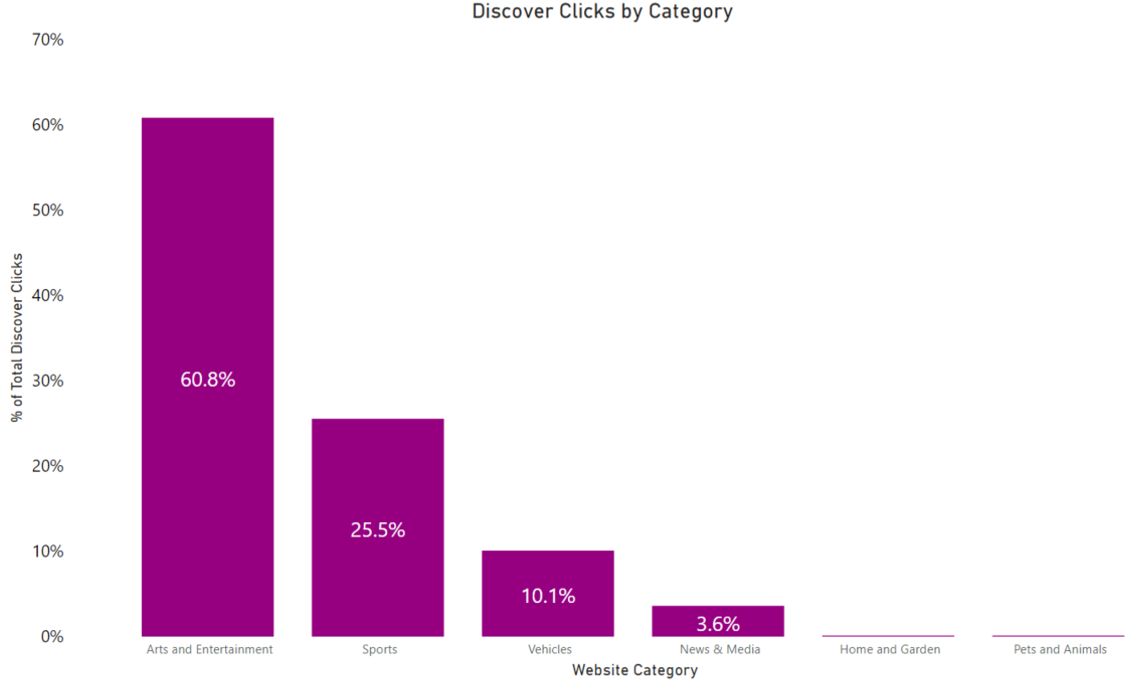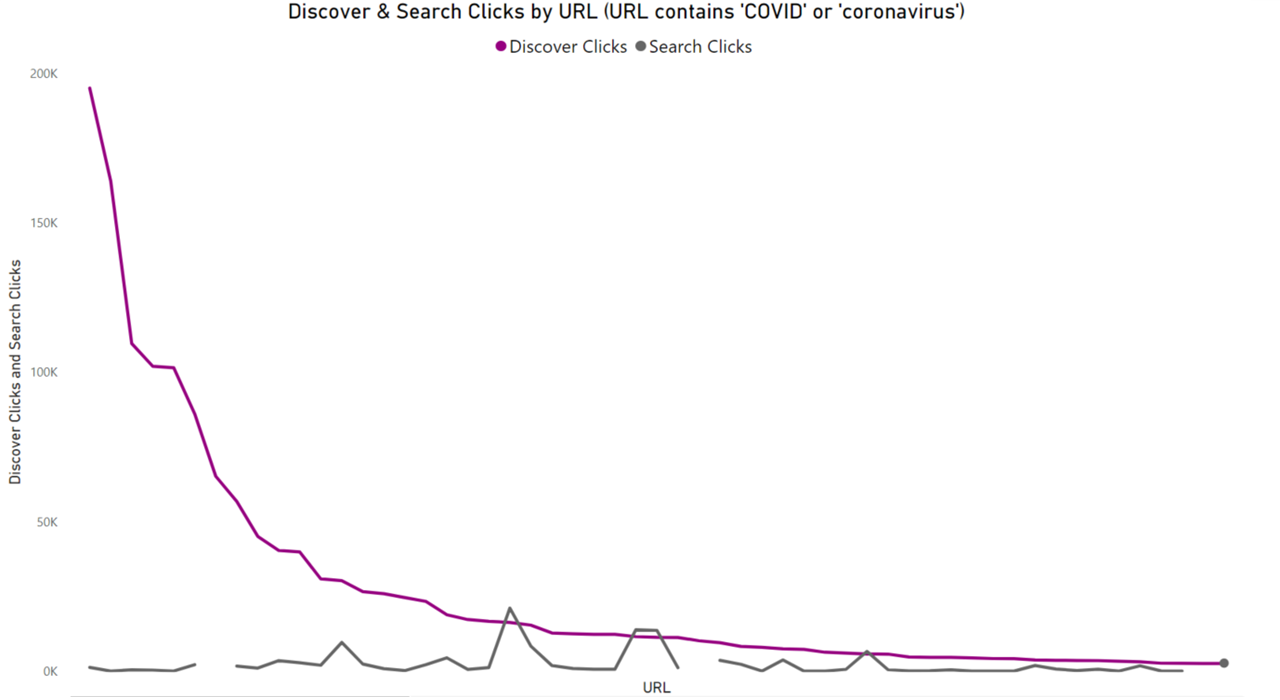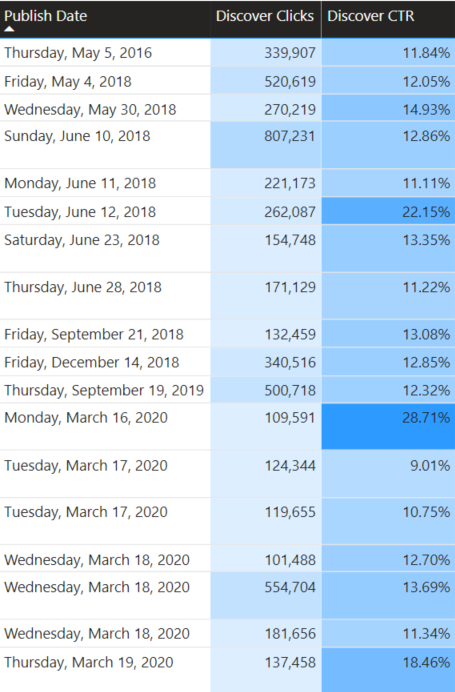Google Discover curates a personalized feed of content for users based on their interests, search history, location, and activity in other apps.
Native to Android devices, it is currently only available on mobile devices or accessible via the Chrome or Google apps on iOS.
The feeds of articles displayed on Google Discover are entirely customized for each user, making it difficult to monitor the average ranking of a given article.
To add to that, reporting on Google Discover presents many challenges. Right now, there is no dedicated referral source in Google Analytics to see traffic from Discover. Traffic shows up as coming in through a variety of organic, direct, and referral sources.
So how can you optimize content for Google Discover?
In this column, you’ll see what tends to do best on Google Discover, based on our analysis of over 7,200 URLs. You’ll also find takeaways to help with your own optimization strategy.
What Makes Google Discover Optimization So Challenging?
Google Search Console has a dedicated Performance report for Discover, which is triggered only if the property receives traffic from Google Discover.
Even so, the criteria for ranking and driving traffic can feel elusive.
SEO tool providers are still trying to figure out how to be able to collect data and share meaningful Discover insights due to the limitations of collecting data.
Furthermore, while Google has published several documents related to ranking in Google Discover, the lack of publicly available performance data coupled with the highly personalized nature of content within Google Discover can make it hard for SEO professionals to try to reverse-engineer what it takes to rank well there.
A Word of Gratitude to Other SEOs Also Obsessed with Google Discover
The lack of SEO tools for Google Discover is not due to a lack of trying.
Props to great SEO experts like Valentin Pletzer, John Shehata, and Abby Hamilton, who have been working hard to try to make sense of Discover data!
Why SEO Pros Should Care About Google Discover
If you’re like many SEO professionals, you may be thinking Google Discover doesn’t apply to you or the sites you work on.
This is a common line of thinking that usually stems from SEO pros thinking their sites don’t qualify as ‘publisher’ websites and are therefore not eligible.
This thinking may also be tied to how difficult it has historically been to get sites approved to appear in Google News (a separate product from Discover), especially when this process required manual approval by Google before 2019.
If you have these thoughts about Google Discover, think again.
Our team works on dozens of clients, and it is always surprising to see which types of sites and content see success in Discover.
For some sites, Google Discover sends more organic traffic than regular organic results. For this reason alone, Discover shouldn’t be ignored!
Beyond that, Google’s core updates can impact Discover performance. You may not even realize you’ve begun to receive (or lose) traffic from Discover after a core update, unless you’re paying attention to that report in Google Search Console.
Below is an example of a client of ours who started to see signs of life on Google Discover during a recent core update.

Google Discover provides another opportunity to earn organic traffic, but it’s a different animal than regular SEO and should be treated accordingly.
Your Discover SEO strategy should be unique from your regular SEO strategy, and the below insights will indicate why.
Methodology and Important Disclaimers
In the below section, I will outline 10 key takeaways I have observed by analyzing 7,274 URLs receiving traffic in Discover from 23 different domains in the following categories (as classified by Similarweb):
- Arts and Entertainment.
- Home and Garden.
- News and Media.
- Pets and Animals.
- Sports.
- Vehicles.

I pulled in Buzzsumo social media and link metrics to cross-reference with article performance to see whether there were correlations between performance on social media and Discover.
Disclaimer: I was surprised to see that the results of this exercise often directly contradicted the advice offered in Google’s Discover guidelines.
Google dedicates an entire section in this document to avoiding tactics such as using clickbait in headlines or other “tactics that manipulate appeal by catering to morbid curiosity, titillation, or outrage.”
In fact, these are some of the very tactics that appear to work best for our clients, as you’ll see below.
With that said, it’s important to preface these findings by saying this analysis was done using a relatively small subset of URLs, and that violating Google’s guidelines in any form always comes with substantial risk.
Also, for the sake of client confidentiality, no actual headlines or URLs will be shared below, but the content will be described in detail.
10 Attributes of Ranking Well in Discover
1. Emotionally Charged Headlines
Google states very clearly that clickbait headlines can make a site ineligible for Google Discover:
“Use page titles that capture the essence of the content, but in a non-clickbait fashion.”
– Get on Discover, Google Search Central
Yet emotionally charged, borderline-clickbait headlines do appear to produce the most clicks and highest CTRs among the analyzed set of URLs.
Here are some examples of phrases used in our clients’ headlines on articles that have received more than 500,000 clicks from Discover in the last 16 months:
- “this heartbreaking moment”
- “stuns the world”
- “cursed out”
- “fans call out”
- “under this 1 condition”
- “was floored”
- “violated 1 of the biggest unwritten rules”
- “just took this massive step”
- “following this simple piece of health advice”
- “confirms the rumor”
- “fans couldn’t handle it”
- “will happen and here’s why”
- “this 1 piece of jewelry”
While the content of these top-performing articles does deliver on what the user was hoping to get out of the headline (a common problem with clickbait headlines), it is questionable whether using “exaggerated” headlines is really such a bad strategy for driving Discover performance after all.
2. Posing Questions in Headlines (with the Answer in the Content)
Another tactic that is thought to be questionable for SEO, but does appear to drive strong click-through rates (CTR) in Google Discover, is posing headlines as a question. Clicking on the article is necessary to get the answer.
For example, we have clients receiving over 15% CTR from Google Discover (with over 100,000 clicks in the past 16 months) by using the following types of phrases in their headlines:
- Did ____ say _____?
- Did ____ do _____?
- Was ____ wearing ___?
While these types of headlines might not pass muster with Google’s SEO algorithms, their enticing nature still appears to resonate with many users in Google Discover, leading to high CTRs.
3. Ranking for COVID Content in Discover, but Not Search
Another observation that came from this analysis was that sites were able to receive traffic from Google Discover from articles and topics where they have never seen significant traffic from regular Search.
Google states front and center that E-A-T (expertise authoritativeness, and trustworthiness) is a crucial factor in determining which sites get to rank in Discover.
Even so (and this is pure speculation), there appears to be a discrepancy in how E-A-T may be calculated across Discover and regular Search.
This was particularly true on the topic of COVID-19, where authority appears to be one of the most important factors for ranking in SEO since the onset of the pandemic.
However, this analysis revealed that many articles dealing with COVID-19 received Discover traffic, where the same article received virtually no clicks from Google’s organic search.

The above chart shows the discrepancy in clicks from Discover vs. Search for 188 URLs containing the words [covid] or [coronavirus] in the URL (which is hidden for client confidentiality purposes).
It is clear that almost all of these URLs saw more traffic from Discover than from regular SEO.
4. Recency is Good, But Some Evergreen Topics Sustain Discover Performance
 One of the most interesting aspects of Google Discover that sets it apart from Google’s more time-sensitive news surfaces such as Top Stories, Google News, and Web Stories, is that Google Discover can sometimes surface content from several years back, even if the content was not edited.
One of the most interesting aspects of Google Discover that sets it apart from Google’s more time-sensitive news surfaces such as Top Stories, Google News, and Web Stories, is that Google Discover can sometimes surface content from several years back, even if the content was not edited.
This provides a huge opportunity for sites that aren’t able to consistently publish new content – old content can still appear in Discover if it meets all the other criteria.
To illustrate these, I pulled in the “date modified” among top-performing articles.
All of the articles shown on the left received over 100,000 clicks from Discover in the past 16 months (from March 2020 – July 2021) despite being more than 15 months old.
For several of these articles, they continue to receive traffic from Google Discover every day.
5. Content That Performs Well in Discover May Not Perform Well in Search (and Vice Versa)
It is important to remember that Google Discover and Google Search use entirely different ranking criteria and the strategy used to rank in either feature should be customized accordingly.
In recent years, with the rise of E-A-T in SEO, it has become more important than ever to ensure content demonstrates the highest possible levels of quality. It’s essential to meet the following criteria laid out in Google’s core update guidelines:
- “Does the content present information in a way that makes you want to trust it, such as clear sourcing, evidence of the expertise involved, background about the author or the site that publishes it, such as through links to an author page or a site’s About page?
- Would you feel comfortable trusting this content for issues relating to your money or your life?
- Is the content free from spelling or stylistic issues?
- Does the headline and/or page title avoid being exaggerating or shocking in nature?”
(… and many more questions where these came from.)
However, this criteria appears to be measured somewhat differently for content that performs well in Google Discover.
Perhaps this is due to the unique behaviors of Discover users and the desire to read fun or lighthearted content in their feeds that is not as focused on E-A-T.
In many ways, Discover behaves more like a social media platform than a search engine.
6. Consistent with the Users’ Beliefs or Political Views
Another obvious observation from this analysis is that some of the top-performing content in Google Discover tends to feed into the existing political or social beliefs of its readers.
For example, articles that may promote outrage or adoration about the behaviors of political figures, celebrities, or the royal family.
7. Discover Topics Can Work Better Than Search When the User Didn’t Know They Were Looking for It
Google Discover is unique from SEO in the sense that SEO only works if and when the user is searching for that topic.
Much like the content displayed on social media platforms like Facebook, Twitter, and Instagram, Google Discover content is often successful even when the user didn’t realize they were looking for it.
For this reason, traditional SEO keyword research methods that work for SEO may not work for Google Discover.
Focusing on topics that actually resonate with the site’s target audience and appeal to their emotions may result in stronger Discover performance.
For example, pet content that tells the personal stories of pets that recovered from obscure illnesses might not present a lot of search volume or potential in Google Search. But we observed that that type of content performs best in Discover for some of our pet clients.
8. Death, Marriage, Divorce
Topics that tend to generate emotion, controversy, and/or empathy do very well in Google Discover.
Deaths, marriages, divorces, interpersonal drama, and gossip are just some examples of this.
Emotionally charged content significantly outperforms all other content in our analysis.
9. Celebrity Gossip
Celebrity gossip as a category receives the lion’s share of Discover traffic in our analysis. This is an interesting trend to consider, especially in light of the organic traffic and visibility declines that many of these types of sites have seen in Google Search, News, and Top Stories in recent years.
The January 2020 update was big for a number of celebrity gossip sites: People, Us Magazine, TMZ, and Radar are some of the biggest losers I've found so far, with ~50% declines in organic visibility. pic.twitter.com/uDqUb49SRR
— Lily Ray 😏 (@lilyraynyc) February 25, 2020
10. Listicles (Numbers in Headlines)
The feasibility of “listicles” as an SEO strategy tends to be a controversial topic among the SEO community.
This type of content is often structured in a way that can lead to poor UX or excessive ads (such as presenting each item in the listicle series on a unique URL where ads reload on each page).
Even so, listicle content performs well in our Discover research. Some of the articles that have seen evergreen traffic from Discover in the past 16 months follow this format.
Headlines include phrases such as:
- 15 reasons why…
- 10 things you should buy…
- 10 cars that…
- These 5 things…
Takeaway From Our Google Discover Analysis
The most important takeaway from this analysis is to realize that Google Discover should form part of your SEO strategy.
The tactics required to perform well in Google Discover may be entirely different from that of your regular SEO content strategy.
Performing well in Google Discover will likely stem from a content strategy mimicking that used on other social platforms, rather than a keyword-research-driven, E-A-T focused SEO strategy.
Tactics that once worked well on Google but are no longer as effective may still work well on Google Discover, despite the suggestions laid out in Google’s own documentation.
More Resources:
- Optimizing for Google Discover: Key Areas to Focus On
- Google Discover: An Image Could Be Worth 1,000 Clicks [Case Study]
- Your Guide to Google E-A-T & SEO
Image Credits
All screenshots taken by author, July 2021

![Google Discover: 10 Characteristics of Top-Performing Content [Study]](https://www.searchenginejournal.com/wp-content/uploads/2021/07/10-attributes-of-top-performing-content-in-google-discover-610149b30e9d3-sej.jpg)



